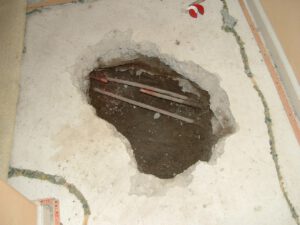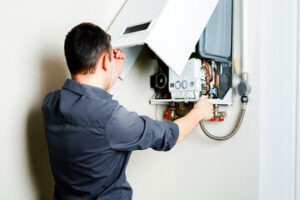Home » Posts tagged 'plumbing services'
Tag Archives: plumbing services
Slab Leaks
Slab leaks occur when the water pipes that supply your house are leaking underneath your foundation. Often, homeowners don’t realize they have a slab leak until it causes major damage to their property and costs them a fortune in repairs.
Luckily, there are some key signs you can watch for that will tell you whether or not you have a slab leak. If you notice one or all of these signs, you should get it fixed immediately!
A slab leak in the pipes that run underneath your home’s concrete foundation can cause a dramatic decrease in water pressure. This can make it difficult to shower, wash dishes, or even get a hot bath.
Low water pressure is a common problem for homes with old pipes, especially those made of galvanized steel. It can also be caused by issues at the water treatment plant, such as when construction temporarily reduces the amount of water that your city can deliver to homes.
Another reason why water pressure may go down is if your plumbing isn’t properly insulated. This can cause rust and moisture to build up in the pipe, which restricts the flow of water.
Slab leaks can also be caused by a poor pH balance in the water or contaminants that corrode copper pipes. If these factors are not corrected, you could end up with a leak in the pipes that run under your home’s foundation.
One of the best ways to detect a leak is to have your home inspected by a licensed professional. This can help prevent a costly slab leak from happening in the first place.
Once a plumber has identified the problem, they can then repair the leak. This can often be done without breaking through your home’s concrete foundation.
A plumber can use a variety of tools to locate a slab leak, including acoustic discs and ground microphones that can hear the sounds that escaping water makes. These tools can help narrow down the location of the leak without cutting through your concrete slab foundation.
The water that leaks through a home’s slab can cause damage to its flooring. Carpet can become damp and dark, while wood flooring develops warped floorboards. This is a common effect of slab leaks and can lead to costly repair or replacement costs.
Cupping is the most mild form of floor damage and can usually be remedied by restoring proper humidity to the room. The result is a slight buckling along the length of each plank, which can be flattened with heavy objects or nailed down and covered up with caulk.
If this doesn’t work, however, you might be dealing with serious damage, which will require major repairs or complete replacement. Fortunately, cupping can often be fixed in some cases by removing the damaged boards and replacing them with new ones.
Warping is a more serious issue, and it can be harder to correct. When wood is warped, the boards are unable to rest flat on the subfloor. The edges of the boards can also start to buckle, and the floors may even begin to split at the edges.
When this happens, you need to call in professional help immediately. The best thing to do is enlist a plumber who can assess the situation and fix the problem before it gets worse.
Slab leaks can cause less water pressure to flow through your pipes. This is especially true when the leak originates from underneath the concrete foundation of your house.
This means that the water pressure at your faucets and other fixtures will be lower than normal, which can also make your water bill skyrocket. This is a clear sign that you have a slab leak, so be sure to contact a plumber if you notice this issue.
What You Need to Know About Water Heater Services
Whether you are looking for a new water heater or want to make sure that you don’t have any issues with your existing one, you will need to know about water heater services. If you don’t know much about your water heater, hire a professional to do the work for you. Having an expert do the job will ensure that you have a system that works well for you and your family.
 Whether you are installing a new water heater in your home or replacing an old model, the question of whether to use gas or electricity is a common one. Depending on the size of your house, your budget, and the quality of your existing unit, one of these options might be a better fit for your home.
Whether you are installing a new water heater in your home or replacing an old model, the question of whether to use gas or electricity is a common one. Depending on the size of your house, your budget, and the quality of your existing unit, one of these options might be a better fit for your home.
While gas and electricity have advantages, they also have disadvantages. One of the biggest disadvantages of using natural gas is the possibility of a gas leak. Another disadvantage of using gas is the cost, which can be quite expensive. Using electricity instead of gas is better if you are looking for a cost-effective and eco-friendly water heater. While it is possible to install a water heater without gas, the installation process is more complex. You will need to make a new vent and run a gas line. In addition, you will need to have a professional install your water heater.
Flush your water heater every six months. Most manufacturers recommend that water heaters be flushed at least once a year. Performing a water heater flush every six months is one of your hot water heater’s most important maintenance tasks. It will not only keep your unit functioning efficiently, but it will also prevent future problems.
The water heater flush is simple, and most people will have no problems performing this maintenance task. It will only take a few hours, and you’ll be rewarded with a much longer life for your water heater.
Water heater flushing is important because it removes deposits at the bottom of your water heater tank. This sludge can affect the performance of your water heater and shorten its lifespan. The sludge may contain minerals, and these minerals can build up over time. When you flush your water heater, you will drain a few gallons of water from the tank. Depending on the size of your tank, you may have to perform this task more than once a year.
Anode rods prevent corrosion. Using anode rods is a good way to prevent corrosion in water heaters. They are made of magnesium, aluminum or zinc and screw into the top of the water heater tank. Anode rods prevent corrosion through electrolysis. Anode rods also protect the metal lining of the water heater from corrosion. However, their lifespan depends on the type of water that is used, as well as the chemistry of the water. They should be checked twice a year to ensure their proper functioning.
If you have hard water, you may need to replace your anode rods more frequently than people who use soft water. Hard water increases mineral buildup, making the anode rod more likely to corrode. Anode rods will usually last five years, but this can vary depending on the chemistry of the water. If you have hard water, you may need a new one every two years.
Repair vs. replacement. Whether to have a water heater repaired or replaced can be tough. The decision should be based on the cost of the repair or replacement, as well as the appliance’s age and lifespan. When a water heater is nearing the end of its lifespan, it may be more cost-effective to replace it. A new model is more energy efficient and could save you a lot of money on utility bills.
Water heaters are essential fixtures in any home. Even if you’ve been happy with your water heater, it may be time to replace it. Some new models are twenty percent more efficient than older models. This can help you save $700 on energy expenses over the unit’s life. If you need help determining whether to repair or replace your water heater, it’s best to call a professional plumber. He can evaluate your water heater and provide you with a cost estimate for either service.